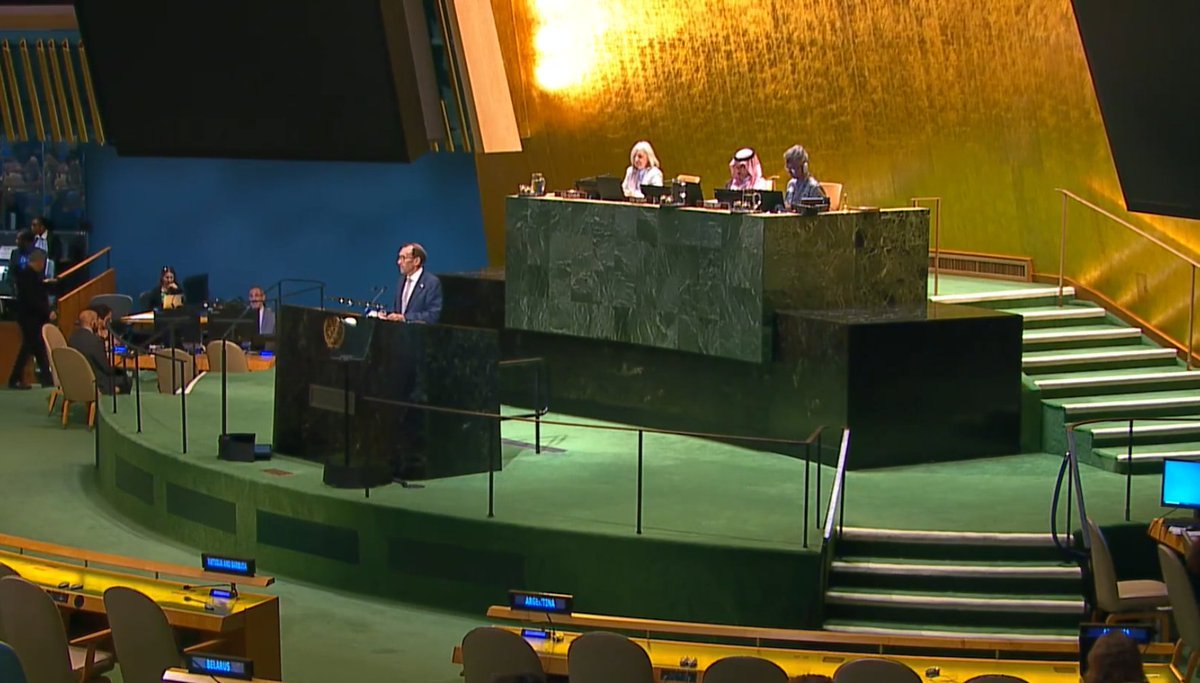New York Declaration: The new UN plan for a Palestinian state with peace in Gaza
Sponsored by France and Saudi Arabia, along with 15 other countries (but not the United States), plus the Arab League, and the European Union, the Declaration was sent to governments around the world to gather support ahead of the UN General Assembly in September. It calls for a ceasefire and an international mission to the Gaza Strip, no longer governed by Hamas, Palestinian elections within a year, and the resumption of negotiations without Israeli annexations. China offered its immediate support.
New York (AsiaNews/Agencies) – The New York Declaration is not only a statement of principle. Issued at the end of the High-Level International Conference on the Peaceful Settlement of the Palestinian Question and the Implementation of the Two-State Solution, its seven pages spell out an ambitious goal, namely the implementation not only of a ceasefire in Gaza, but also restarting negotiations to find a “peaceful solution to the question of Palestine” through the “realization” of the two-state solution in Israel and Palestine.
Jointly promoted by Saudi Arabia and France, the document objectively represents a new development. For the first time, a Middle East peace plan has been discussed by the international community. Conceived independently of the United States, it was endorsed by 17 countries, including France, Great Britain, Spain, Italy, Saudi Arabia, Egypt, Jordan, Qatar, and Turkey, as well as Brazil, Mexico, Canada, Japan, and Indonesia, as well as the Arab League and the European Union.
After its approval, the Declaration is now making its way to countries around the world, with the aim of gathering as many formal endorsements as possible by 5 September and then be discussed at the UN General Assembly.
As we wrote a few days ago, this is the political framework around which various governments have been openly supporting the recognition of a Palestinian state in the past few weeks. It is no coincidence that just yesterday, in conjunction with this UN Conference, British Prime Minister Keir Starmer also expressed his support.
For this very reason, various world leaders have stated that the recognition would occur in September.
“Recent developments have highlighted, once again, and more than ever, the terrifying human toll and the grave implications for regional and international peace and security of the persistence of the Middle East conflict,” reads the Declaration.
“We reiterated our condemnation of all attacks by any party against civilians, including all acts of terrorism and indiscriminate attacks, and all attacks against civilian objects, acts of provocation, incitement and destruction. We recall that the taking of hostages is prohibited under international law.
“We reaffirm our rejection of any actions leading to territorial or demographic changes, including forced displacement of the Palestinian civilian population, which constitutes a flagrant violation of International humanitarian law.”
“We condemn the attacks committed by Hamas against civilians on the 7th of October. We also condemn the attacks by Israel against civilians in Gaza and civilian infrastructure, siege and starvation, which have resulted in a devastating humanitarian catastrophe and protection crisis.”
“War, occupation, terror and forced displacement cannot deliver either peace or security. Only a political solution can.”
The most significant part is clearly the path to get there, which the document clearly points to.
The signatory countries express support for the efforts of Egypt, Qatar, and the United States to implement a ceasefire in Gaza “leading to a permanent end to hostilities”. In this context, Hamas is asked to release all hostages.
At the same time, “Hamas must end its rule in Gaza and hand over its weapons to the Palestinian Authority, with international engagement and support, in line with the objective of a sovereign and independent Palestinian State.”
For this reason, it is proposed to deploy “a temporary international stabilization mission [in Gaza] upon invitation by the Palestinian Authority and under the aegis of the United Nations”.
As for the Palestinian government in Ramallah, President Mahmoud Abbas is asked to honour his commitment to hold "democratic and transparent general and presidential elections" within a year (they have not been held since 2006), allowing a "new generation of elected representatives" to assume responsibility for the Palestinian Authority.
The signatory countries call on Israel to make "a clear public commitment to the Two-State solution" (which the Netanyahu government expressly rejects) and to renounce “any annexation project or settlement policy”.
They also demand guarantees regarding the maintenance of the status quo for Christian and Islamic holy places in Jerusalem, emphasising the "key role" assigned to the Hashemite Kingdom of Jordan in this regard.
Concerning negotiations between Israelis and Palestinians for a definitive resolution to the conflict, to be restarted within this internationally guaranteed framework, specific reference is made to the 1991 Madrid Conference (which was the political premise for the Oslo Accords) and the Arab Peace Initiative, the peace plan adopted by the Arab League in 2002.
The Declaration also notes that “Regional integration and independent Palestinian Statehood are intertwined objectives,” evoking the possible establishment of a regional cooperation body modelled after ASEAN or the OSCE in Europe.
The document is on the table as of today. While the Netanyahu government has rejected it outright and Washington has shown the cold shoulder, China has come out in favour.
In his daily press conference, Foreign Ministry spokesman Guo Jiakun congratulated "Saudi Arabia and France for their efforts. The meeting further builds international consensus on the Palestinian issue and sends a strong message calling for a political settlement with the two-State formula, which is welcomed by China.”
“We stand ready to continue to work with the international community to end the fighting in Gaza, ease the humanitarian crisis, implement the two-State solution, and ultimately realize the comprehensive, just and lasting settlement of the Palestinian question.”







.png)










